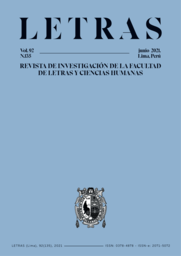El El libro de mis primos by Cristina Peri Rossi. The creation of a new order
Abstract
El libro de mis primos (1969), novel by Cristina Peri Rossi (Montevideo, 1941), is built around a family governed by a hierarchical, authoritarian and violent system which towards the end is destroyed by “the cousins”, the children of the family. They are the ones who tear down the house of their ancestors, in a literal and symbolic sense. The fall of the family order is followed by the fall of a repressive state, so that both orders collapse simultaneously. In this way, at the same time, two oppressive and authoritarian institutions are demolished. In this article we are interested in exploring the intersections between both spheres, family and political, and for this, we will establish a dialogue with the Uruguayan political and social situation —which will be read within the Latin American revolutionary panorama—, at the time of publication of the novel. This is a moment of marked political agitation and effervescence, motivated, above all, by the triumphof the Cuban Revolution, the emergence of local and global social movements —particularly condensed in 1968—, and the near threat of the military dictatorships carried out in the Southern Cone, throughout the seventies.Downloads
Métricas alternativas
References
Agamben, G. (2016 [1970]). Sobre los límites de la violencia. Fractal. Revista de teoría y cultura, 78. México.
https://www.mxfractal.org/articulos/RevistaFractal78Agamben.php
Basile, T. (2018). El desarme de Calibán. Debates culturales y diseños literarios en la posdictadura uruguaya. Pittsburgh: Instituto Internacional de Literatura Iberoamericana.
Dalton, R., Depestre, R., Desnoes, E., et ál. (1969). El intelectual y la sociedad. Ciudad de México: Siglo Veintiuno Editores.
Dejbord, P. (1998). “Entrevista a Cristina Peri Rossi”. En Cristina Peri Rossi: escritora del exilio. Buenos Aires: Galerna.
Fernández Retamar, R. (1984). Calibán. Apuntes sobre la cultura de nuestra América. Buenos Aires: Editorial La Pleyade.
Gatto Fernández, H. (2004). El cielo por asalto. Montevideo: Taurus.
Guevara, E. (2011 [1965]). El socialismo y el hombre en Cuba. La Habana: Ocean Sur.
Moraña, M. (2004). Crítica impura: estudios de literatura y cultura latinoamericanos. Madrid, Fráncfort del Meno: Iberoamericana, Vervuert.
Peri Rossi, C. (1969). El libro de mis primos. Montevideo: Biblioteca de Marcha.
Peri Rossi, C. (1976). La tarde del dinosaurio. Barcelona: Planeta.
Peri Rossi, C. (1980). La rebelión de los niños. Caracas: Monte Ávila.
Peri Rossi, C. (2003). Estado de exilio. Madrid: Visor Libros.
Saona, M. (2004). La familia del “hombre nuevo” y la revolución en El libro de mis primos de Cristina Peri Rossi. En M. Saona, Novelas familiares. Figuraciones de la nación en la novela latinoamericana contemporánea. Rosario: Beatriz Viterbo.
Verani, H. (1992). Narrativa uruguaya contemporánea: periodización y cambio literario. Revista iberoamericana, 58(160-161), 777-805. https://doi.org/10.5195/REVIBEROAMER.1992.5074
Copyright (c) 2021 Letras (Lima)

This work is licensed under a Creative Commons Attribution 4.0 International License.
Este obra está bajo una licencia de Creative Commons Reconocimiento 4.0 Internacional



















